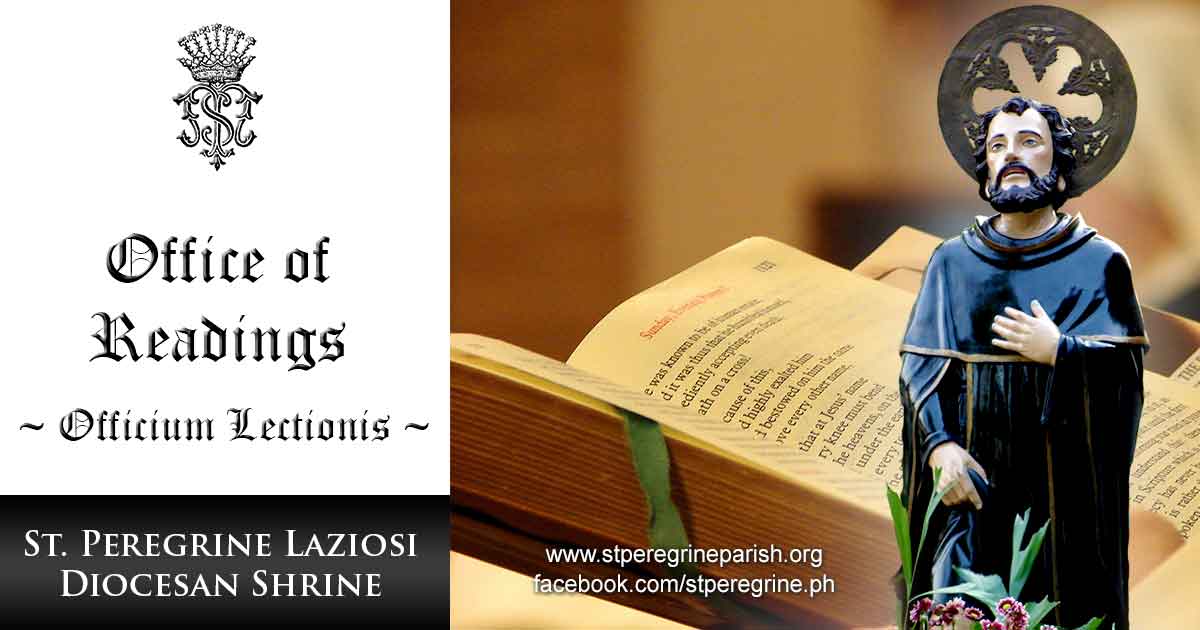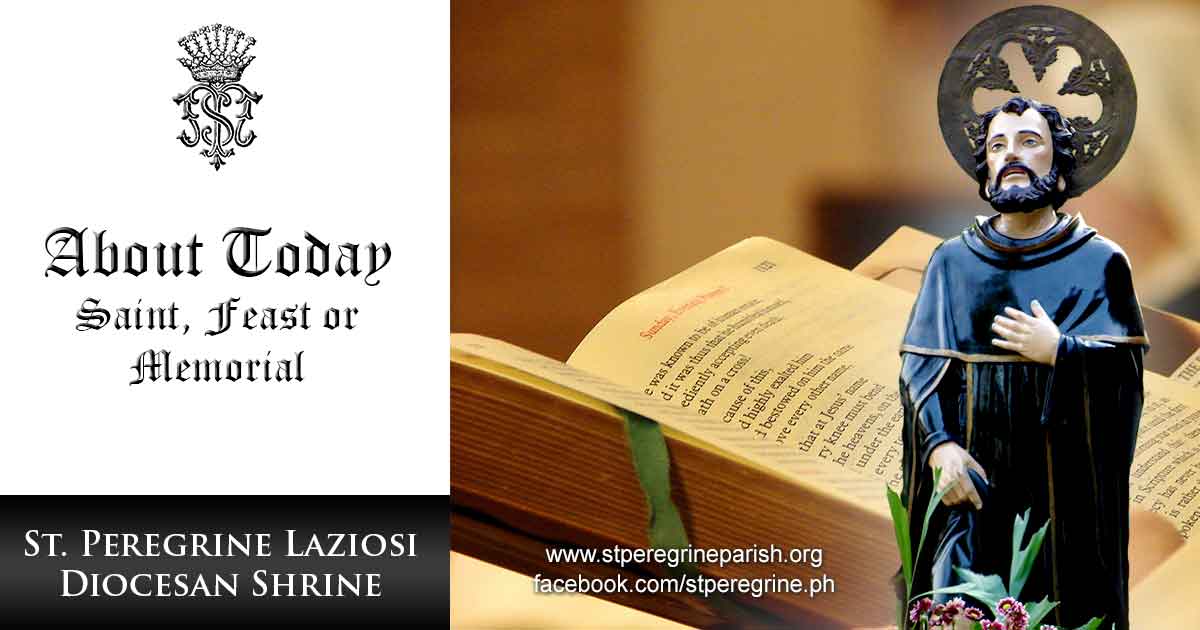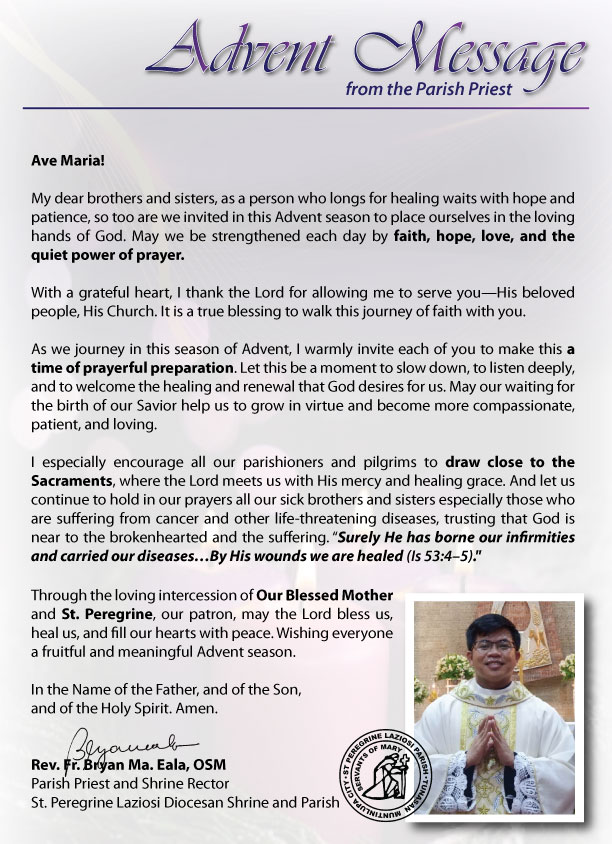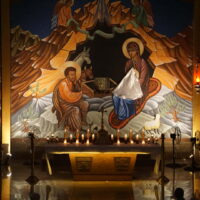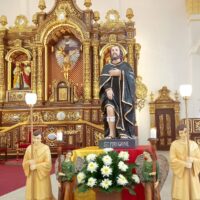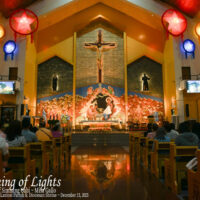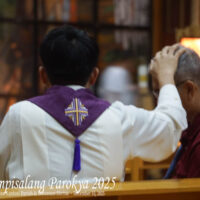Ribbon Placement:
Liturgy of the Hours Vol. II:
Ordinary: 1045
Proper of Seasons: 447
Psalter: Wednesday, Week II, 1277
Office of Readings for Wednesday in Holy Week
God, come to my assistance.
— Lord, make haste to help me.
Glory to the Father, and to the Son, and to the Holy Spirit:
— as it was in the beginning, is now, and will be for ever. Amen.
HYMN
Chorus:
The Lord is my shepherd; There is nothing I shall want.
The Lord is my shepherd; There is nothing I shall want.
The Lord is my shepherd; I shall not want.
In verdant pastures he gives me repose;
Chorus:
The Lord is my shepherd; There is nothing I shall want.
The Lord is my shepherd; There is nothing I shall want.
The Lord is my shepherd; There is nothing I shall want.
Beside restful waters He leads me;
He refreshes my soul.
He guides me in right paths
for His name’s sake.
Chorus:
The Lord is my shepherd; There is nothing I shall want.
The Lord is my shepherd; There is nothing I shall want.
The Lord is my shepherd; There is nothing I shall want.
You spread the table before me
in the sight of my foes;
you anoint my head with oil;
my cup overflows.
Only goodness and kindness follow me
all the days of my life;
and I shall dwell in the house of the Lord
for years to come.
Chorus:
The Lord is my shepherd; There is nothing I shall want.
The Lord is my shepherd; There is nothing I shall want.
| 𝄞 | “The Lord is My Shepherd” by Bill Goyette • Musical Score • Text: Based on Psalm 23; Music: William R. Goyette; Arrangement: Michael V. Guzman and Cesar Marquez; (c) 1997 William R. Goyette; Licensed under Creative Commons |
PSALMODY
Ant. 1 We groan in pain as we await the redemption of our bodies.
Psalm 39
Urgent prayer of a sick person
Creation is made subject to futility…by him who subjected it, but it is not without hope (Romans 8:20).
I
I said: “I will be watchful of my ways
for fear I should sin with my tongue.
I will put a curb on my lips
when the wicked man stands before me.”
I was dumb, silent and still.
His prosperity stirred my grief.
My heart was burning within me.
At the thought of it, the fire blazed up
and my tongue burst into speech:
“O Lord, you have shown me my end,
how short is the length of my days.
Now I know how fleeting is my life.
You have given me a short span of days;
my life is as nothing in your sight.
A mere breath, the man who stood so firm,
a mere shadow, the man passing by,
a mere breath, the riches he hoards,
not knowing who will have them.”
Glory to the Father, and to the Son, and to the Holy Spirit:
— as it was in the beginning, is now, and will be for ever. Amen.
Ant. We groan in pain as we await the redemption of our bodies.
Ant. 2 Hear and answer my prayer, O Lord; let me not weep in vain.
II
And now, Lord, what is there to wait for?
In you rests all my hope.
Set me free from all my sins,
do not make me the taunt of the fool.
I was silent, not opening my lips,
because this was all your doing.
Take away your scourge from me.
I am crushed by the blows of your hand.
You punish man’s sins and correct him;
like the moth you devour all he treasures.
Mortal man is no more than a breath;
O Lord, hear my prayer.
O Lord, turn your ear to my cry.
Do not be deaf to my tears.
In your house I am a passing guest,
a pilgrim, like all my fathers.
Look away that I may breathe again,
before I depart to be no more.
Glory to the Father, and to the Son, and to the Holy Spirit:
— as it was in the beginning, is now, and will be for ever. Amen.
Psalm-prayer
Through your Son you taught us, Father, not to be fearful of tomorrow but to commit our lives to your care. Do not withhold your Spirit from us but help us find a life of peace after these days of trouble.
Ant. Hear and answer my prayer, O Lord; let me not weep in vain.
Ant. 3 I have put all my trust in God’s never-failing mercy.
Psalm 52
Against a calumniator
If anyone would boast, let him boast in the Lord (1 Corinthians 1:31).
Why do you boast of your wickedness,
you champion of evil,
planning ruin all day long,
your tongue like a sharpened razor,
you master of deceit?
You love evil more than good;
lies more than truth.
You love the destructive word,
you tongue of deceit.
For this God will destroy you
and remove you for ever.
He will snatch you from your tent and uproot you
from the land of the living.
The just shall see and fear.
They shall laugh and say:
“So this is the man who refused
to take God as his stronghold,
but trusted in the greatness of his wealth
and grew powerful by his crimes.”
But I am like a growing olive tree
in the house of God.
I trust in the goodness of God
for ever and ever.
I will thank you for evermore;
for this is your doing.
I will proclaim that your name is good,
in the presence of your friends.
Glory to the Father, and to the Son, and to the Holy Spirit:
— as it was in the beginning, is now, and will be for ever. Amen.
Psalm-prayer
Father, you cut down the unfruitful branch for burning and prune the fertile to make it bear more fruit. Make us grow like laden olive trees in your domain, firmly rooted in the power and mercy of your Son, so that you may gather from us fruit worthy of eternal life.
Ant. I have put all my trust in God’s never-failing mercy.
Sacred Silence (indicated by a bell) – a moment to reflect and receive in our hearts the full resonance of the voice of the Holy Spirit and to unite our personal prayer more closely with the word of God and public voice of the Church.
When I am lifted up from the earth.
— I will draw all men to myself.
READINGS
First reading
From the letter to the Hebrews
12:14-29
You have come to the mountain of the living God
Strive for peace with all men, and for that holiness without which no one can see the Lord. See to it that no man falls away from the grace of God; that no bitter root springs up through which many may become defiled; that there be among you no fornicator or godless person like Esau, who sold his birthright for a meal. You know that afterward he wanted to inherit his father’s blessing, but he was rejected because he had no opportunity to alter his choice, even though he sought the blessing with tears.
You have not drawn near to an untouchable mountain and a blazing fire, nor gloomy darkness and storm and trumpet blast, nor a voice speaking words such that those who heard begged that they be not addressed to them, for they could not bear to hear the command: “If even an animal touches the mountain, it must be stoned to death.” Indeed, so fearful was the spectacle that Moses said, “I am terrified and trembling.”
No, you have drawn near to Mount Zion and the city of the living God, the heavenly Jerusalem, to myriads of angels in festal gathering, to the assembly of the firstborn enrolled in heaven, to God the judge of all, to the spirits of just men made perfect, to Jesus, the mediator of a new covenant, and to the sprinkled blood which speaks more eloquently than that of Abel.
Do not refuse to hear him who speaks. For if the Israelites did not escape punishment when they refused to listen as God spoke to them on earth, how much greater punishment will be ours if we turn away from him who speaks from heaven! His voice then shook the earth, but now he has promised, “I will once more shake not only earth but heaven!” And that “once more” shows that shaken, created things will pass away, so that only what is unshaken may remain.
Wherefore, we who are receiving the unshakable kingdom should hold fast to God’s grace, through which we may offer worship acceptable to him in reverence and awe. For our God is a consuming fire.
RESPONSORY Dt. 5:23-24; see Heb. 12:22
You heard God speaking from the darkness, and saw Mount Sinai, ablaze with fire. You came to Moses crying:
— See how the Lord our God has shown us his greatness and his glory!
Now you have come to Mount Zion and to the city of the living God, the heavenly Jerusalem.
— See how the Lord our God has shown us his greatness and his glory!
Second reading
From a treatise on John by Saint Augustine, bishop
The perfection of love
Dear brethren, the Lord has marked out for us the fullness of love that we ought to have for each other. He tells us: No one has greater love than the man who lays down his life for his friends. In these words, the Lord tells us what the perfect love we should have for one another involves. John, the evangelist who recorded them, draws the conclusion in one of his letters: As Christ laid down his life for us, so we too ought to lay down our lives for our brothers. We should indeed love one another as he loved us, he who laid down his life for us.
This is surely what we read in the Proverbs of Solomon: If you sit down to eat at the table of a ruler, observe carefully what is set before you; then stretch out your hand, knowing that you must provide the same kind of meal yourself. What is this ruler’s table if not the one at which we receive the body and blood of him who laid down his life for us? What does it mean to sit at this table if not to approach it with humility? What does it mean to observe carefully what is set before you if not to meditate devoutly on so great a gift? What does it mean to stretch out one’s hand, knowing that one must provide the same kind of meal oneself, if not what I have just said: as Christ laid down his life for us, so we in our turn ought to lay down our lives for our brothers? This is what the apostle Paul said: Christ suffered for us, leaving us an example, that we might follow in his footsteps.
This is what is meant by providing “the same kind of meal.” This is what the blessed martyrs did with such burning love. If we are to give true meaning to our celebration of their memorials, to our approaching the Lord’s table in the very banquet at which they were fed, we must, like them, provide “the same kind of meal.”
At this table of the Lord we do not commemorate the martyrs in the same way as we commemorate others who rest in peace. We do not pray for the martyrs as we pray for those others, rather, they pray for us, that we may follow in his footsteps. They practiced the perfect love of which the Lord said there could be none greater. They provided “the same kind of meal” as they had themselves received at the Lord’s table. This must not be understood as saying that we can be the Lord’s equals by bearing witness to him to the extent of shedding our blood. He had the power of laying down his life; we by contrast cannot choose the length of our lives, and we die even if it is against our will. He, by dying, destroyed death in himself; we are freed from death only in his death. His body did not see corruption; our body will see corruption and only then be clothed through him in incorruption at the end of the world. He needed no help from us in saving us; without him we can do nothing. He gave himself to us as the vine to the branches; apart from him we cannot have life.
Finally, even if brothers die for brothers, yet no martyr by shedding his blood brings forgiveness for the sins of his brothers, as Christ brought forgiveness to us. In this he gave us, not an example to imitate but a reason for rejoicing. Inasmuch, then, as they shed their blood for their brothers, the martyrs provided “the same kind of meal” as they had received at the Lord’s table. Let us then love one another as Christ also loved us and gave himself up for us.
RESPONSORY 1 John 4:9, 11, 10
God showed his love for us by sending his only Son into the world to give us life through him.
— Since God has loved us so much, we too should love one another.
God loved us first, and sent his own Son to be the sacrifice that takes away our sin.
— Since God has loved us so much, we too should love one another.
CONCLUDING PRAYER
O God,
who willed your Son to submit
for our sake to the yoke of the Cross,
so that you might drive from us the power of the enemy,
grant us, your servants,
to attain the grace of the resurrection.
Through our Lord Jesus Christ, your Son,
who lives and reigns with you in the unity of the Holy Spirit,
God, for ever and ever.
— Amen.
Acclamation (at least in the communal celebration)
Let us praise the Lord.
— And give him thanks.
The English translation of The Liturgy of the Hours (Four Volumes) ©1974,
International Commission on English in the Liturgy
Corporation. Readings and Old and New Testament Canticles (except the Gospel Canticles) are from the New American Bible
© 1970 Confraternity of Christian Doctrine, Washington, D.C.. Used with permission. All rights reserved.
The DivineOffice.org website, podcast, apps and all related media follows the liturgical calendar for the United States.
The 1970 edition of the New American Bible as published in the Liturgy of the Hours is approved for use
only in the United States. DivineOffice.org website, podcast, apps and all related media is © 2006-2021
Surgeworks, Inc. All rights reserved.
 Diocese of Parañaque
Diocese of Parañaque

